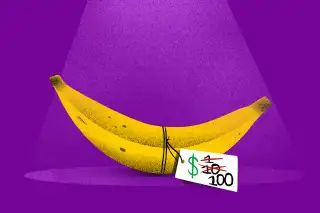Inflation Explained: Should You Worry About Rising Prices Post-Pandemic?

Imagine if a helicopter suddenly dropped $5,000 on every person in the country. Lots of people would want to use the cash to buy stuff, right? But there wouldn’t automatically be more stuff available for them to buy. As demand outpaced supply, prices would rise.
It's an oversimplification that, in a nutshell, describes what some experts are worried could happen in the post-pandemic economy. They join a growing chorus of voices raising concerns about inflation, leading to alarming headlines and quotes about how "investors should be prepared for the biggest inflation scare in America" since the 1980s.
But how worried should you, a non-expert, be? Here's everything you need to know about inflation.
What is inflation, and why is it in the news right now?
The basic definition of inflation is a general increase in prices across the board, says Scott Baier, chair of the John E. Walker department of economics at Clemson University. We're talking about everything from the price of bananas at Trader Joe's to the price for the gas in the semi trucks that deliver them.
Inflation occurs when there are too many dollars chasing too few goods. Ann Owen, an economics professor at Hamilton College, says inflation is a hot topic right now because of — what else? — the pandemic. For the past year or so, because the country has been locked down, most people haven’t been able to spend money like normal. On top of that, due to the widespread job loss, many haven’t wanted to.
But we seem to be approaching a turning point. States like Florida and Texas are open for business with no stay-at-home orders. Some 167 million vaccines have been administered; people are becoming less afraid to leave their homes. And after an interminable winter, summer is coming.
“The idea is that people have been stuck in their houses for a year, and when they finally get permission to leave, they’re going to go out and spend a lot of money,” Owen says. “As demand goes up, so does the price.”
How bad will inflation get?
We know that many Americans have a lot of cash on hand, in part because of the three rounds of stimulus checks approved by Congress. But the extent to which inflation will pick up, and how fast it happens, is still up in the air, says Edward Knotek, senior vice president and research economist at the Federal Reserve Bank of Cleveland.
The Fed tries to keep inflation in check by adjusting the federal funds rate, or the rate at which banks lend each other money. It generally likes to see inflation at 2%, which it claims on its website is consistent with “maximum employment and price stability,” allowing people to “make sound decisions regarding saving, borrowing and investment.”
But back in August, Chairman Jerome Powell announced a “robust updating” of the 2% standard. He said the Fed is targeting 2% over the long run, meaning it’ll let inflation rise moderately above the normal goal as long as it averages out. Last week, he elaborated on the pent-up pandemic demand problem, saying that he predicts “the effect on inflation will be neither particularly large nor persistent.”
Unfortunately, we don’t really have any sort of precedent to know for sure how this will play out. People keep saying how unique the ongoing coronavirus financial/health crisis is, and they're not exaggerating. Knotek says the dynamics of the economy are different now than they were in previous recessions. That’s only increased uncertainty.
What does this all actually mean? Is milk going to cost $100 in a month's time?
Probably not. It’s important to note that all prices won’t jump at the same time. Some products may become more expensive, while some may become less expensive, Knotek says. Plus, the potential increases are pretty small in the grand scheme of things.
Back in 1974, the U.S. saw inflation (as measured by the consumer price index) rise 12.2%. In contrast, predictions now hover around 2.5%.
“We are talking about a percentage-point swing. We’re not talking about a massive jump in inflation this year,” Knotek says.
How to prepare for inflation (just in case)
From a savings point of view, Blue Ocean Global Wealth CEO Marguerita Cheng says she understands why people may be anxious about the possibility of inflation. Because the Fed has kept interest rates low, “if you’re trying to be a saver, you’re not too happy,” she adds.
Cheng, also a CFP Board ambassador, says you should still have a relatively liquid emergency fund you can access in the short term. For the long term, stocks are a good hedge against inflation, especially for young people with decades to go before retirement.
“Over time, the growth rate does outpace inflation,” she says.
Bottom line? People are buzzing about inflation because the economy is opening back up, and there’s some concern that pent-up demand could increase prices. (There’s also some meta concern that the expectation of inflation could actually cause inflation, but that's another story.)
While you may want to mentally prepare for the possibility of inflation and consider having a conversation with a financial advisor about how to adjust your portfolio, there's no need to panic.
"The sky is not falling," Owen says.
More from Money:
Current Mortgage Rates Drop For First Time in Over Two Months
This Key Bond Indicator Is Signaling Inflation. Here's What It Means for Your Portfolio